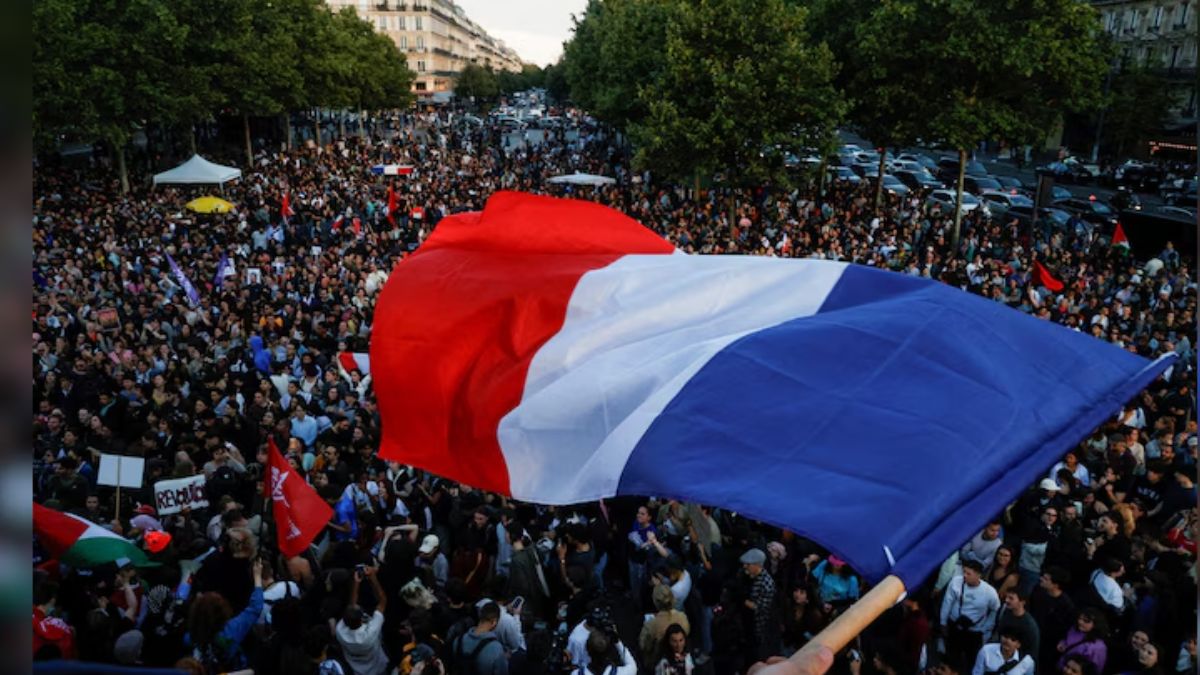The French legislative elections saw an unexpected outcome as the left-wing New Popular Front (NFP) emerged as the largest bloc, with Marine Le Pen’s far-right National Rally (RN) placing third. The campaign period was marked by a surge in hate speech, racism, and antisemitism, with the RN targeting Muslim influences and France Unbowed facing accusations of antisemitism read more
)
Despite a coalition of centrist and left-wing parties winning the election, concerns about hate speech increasing in France persist. Reuters
The recent French legislative elections, which many anticipated would propel Marine Le Pen’s far-right National Rally (RN) to significant power, ended unexpectedly with the left-wing New Popular Front (NFP) emerging as the largest bloc. The anti-immigration RN ultimately placed third, as centrists and leftists strategically united, often withdrawing candidates in three-way races to support the contender most likely to defeat the far-right.
Even after the coalition winning the snap elections, fears of increase in hate speech in France continue to exist. We explain why.
Election campaign and hate speech
Leading up to the elections, there was a marked increase in hate speech, as well as incidents of racism and antisemitism.
The RN has long campaigned against what it describes as the encroachment of Muslim religious and cultural influences in France, frequently targeting Muslim women who wear headscarves and linking them to Islamist extremism. Their campaign manifesto, under the section “Preserving French civiliastion,” promises legislation aimed at “Islamist ideologies,” which they deem a “totalitarian threat of modern times.”
Support for the eurosceptic National Rally has surged over the past decade. Many observers noted a significant rise in hate speech and intolerance during the heated campaign period. Dominique Sopo, head of the civil society group SOS Racisme, remarked, “The essential message of the National Rally is that French people would be better off ‘if they strike, one way or another — symbolically, legally — immigrants and their children.’”
A viral video featuring two RN supporters verbally assaulting a black woman further inflamed the political climate in the days leading up to the election.
Conversely, the hard-left France Unbowed party has vocally condemned Israel’s actions in its war against Hamas, accusing it of pursuing genocide against Palestinians. This stance has intensified the country’s divisions, particularly among France’s Jewish community, which numbers around half a million. The contentious debate over the Hamas-Israel conflict thrust the Jewish community into the electoral spotlight, with accusations of antisemitism being traded across the political spectrum.
Despite these allegations, France Unbowed does not explicitly endorse generalized hatred towards Jews in their manifesto and has consistently denied accusations of antisemitism. Nonetheless, the electoral campaign has laid bare the persistent issue of racist hate speech and sporadic violence, which many fear will not dissipate with the new parliament.
Overall rise in hate speech in France
A human rights panel reported a sharp increase in complaints about racist and antisemitic acts, with France’s National Consultative Commission on Human Rights noting a 32 per cent rise in racist incidents in 2023 and a staggering 284 per cent surge in antisemitic acts compared to 2022. These figures likely underrepresent the true extent of the problem, as many victims do not report incidents.
Fear of growing hate speech
The RN’s failure to secure a leading position, despite initial polling advantages, may fuel a sense of marginalisation and resentment among its supporters. This sentiment can potentially lead to increased xenophobic rhetoric and actions. Historically, far-right factions have reacted to electoral setbacks with heightened hostility towards immigrants and minorities, often leveraging social media and public protests to voice their grievances. Marine Le Pen has characterized the loss as a temporary setback, emphasising that their support base remains robust and motivated for future political endeavors.
On the opposite end of the spectrum, the left-wing coalition, particularly France Unbowed led by Jean-Luc Mélenchon, faces persistent allegations of antisemitism. This has created unease among many French Jews, who feel threatened by the party’s rhetoric. The coalition’s contentious stance on international issues, such as the Israel-Palestine conflict, further complicates France’s internal dynamics, exacerbating tensions within its diverse communities.
The entrenched political polarisation in France suggests that both far-right and far-left factions may continue to engage in inflammatory discourse, each accusing the other of fostering hate.
This ongoing antagonism risks perpetuating a cycle of provocation and retaliation, escalating the overall level of hate speech in the country.
With inputs from agencies

 2 months ago
40
2 months ago
40
)
)
)
)
)
)
)
)
)
)
)
)
)
)
)
)
)
)
)
)
)
)
)
)
)
 English (US) ·
English (US) ·